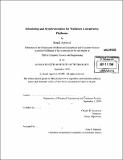| dc.contributor.advisor | Charles E. Leiserson. | en_US |
| dc.contributor.author | Agrawal, Kunal | en_US |
| dc.contributor.other | Massachusetts Institute of Technology. Dept. of Electrical Engineering and Computer Science. | en_US |
| dc.date.accessioned | 2010-05-25T20:39:52Z | |
| dc.date.available | 2010-05-25T20:39:52Z | |
| dc.date.copyright | 2009 | en_US |
| dc.date.issued | 2009 | en_US |
| dc.identifier.uri | http://hdl.handle.net/1721.1/55083 | |
| dc.description | Thesis (Ph. D.)--Massachusetts Institute of Technology, Dept. of Electrical Engineering and Computer Science, 2009. | en_US |
| dc.description | Cataloged from PDF version of thesis. | en_US |
| dc.description | Includes bibliographical references (p. 217-230). | en_US |
| dc.description.abstract | Developing correct and efficient parallel programs is difficult since programmers often have to manage low-level details like scheduling and synchronization explicitly. Recently, however, many hardware vendors have been shifting towards building multicore computers. This trend creates an enormous pressure to create concurrency platforms - platforms that provide an easier interface for parallel programming and enable ordinary programmers to write scalable, portable and efficient parallel programs. This thesis provides some provably-good practical solutions to problems that arise in the implementation of concurrency platforms, particularly in the domain of scheduling and synchronization. The first part of this thesis describes work on scheduling of parallel programs written in dynamic multithreaded languages (such as Cilk, Hood etc.). These languages allow the programmer to express parallelism of their code in a natural manner, while an automatic scheduler in the concurrency platform is responsible for scheduling the program on the underlying parallel hardware. This thesis presents designs to increase the functionality of these concurrency platforms. The second part of the thesis presents work on transactional memory semantics and design. Transactional memory (TM), has been recently proposed as an alternative to locks. TM provides a transactional interface to memory. The programmers can specify their critical sections inside a transaction, and the TM concurrency platform guarantees that the region executes atomically. One of the purported advantages of TM over locks is that transactional code is composable. | en_US |
| dc.description.abstract | (cont.) Most of the current TM concurrency platforms do not support full composability, however. This thesis addresses two of the composability problems in existing TM concurrency platforms. | en_US |
| dc.description.statementofresponsibility | by Kunal Agrawal. | en_US |
| dc.format.extent | 230 p. | en_US |
| dc.language.iso | eng | en_US |
| dc.publisher | Massachusetts Institute of Technology | en_US |
| dc.rights | M.I.T. theses are protected by
copyright. They may be viewed from this source for any purpose, but
reproduction or distribution in any format is prohibited without written
permission. See provided URL for inquiries about permission. | en_US |
| dc.rights.uri | http://dspace.mit.edu/handle/1721.1/7582 | en_US |
| dc.subject | Electrical Engineering and Computer Science. | en_US |
| dc.title | Scheduling and synchronization for multicore concurrency platforms | en_US |
| dc.type | Thesis | en_US |
| dc.description.degree | Ph.D. | en_US |
| dc.contributor.department | Massachusetts Institute of Technology. Department of Electrical Engineering and Computer Science | |
| dc.identifier.oclc | 587603716 | en_US |
